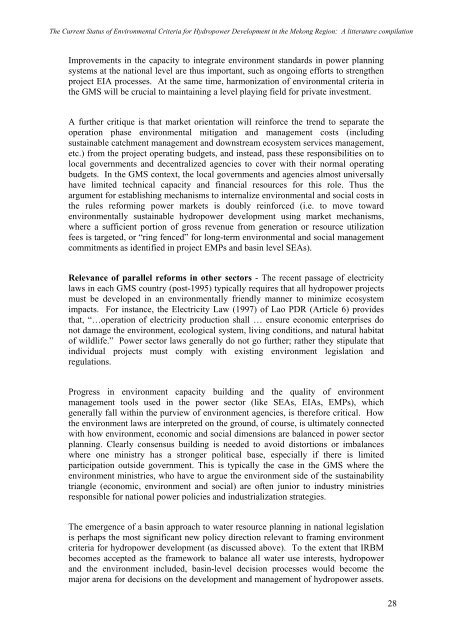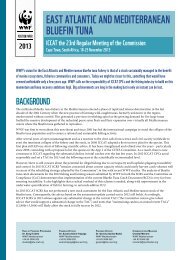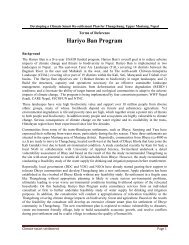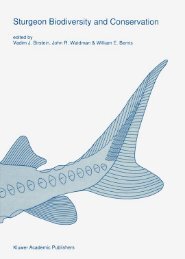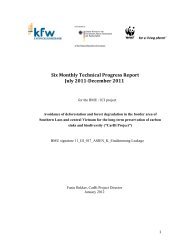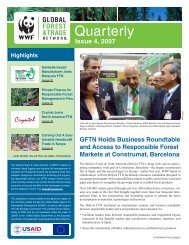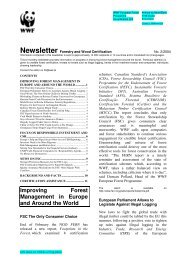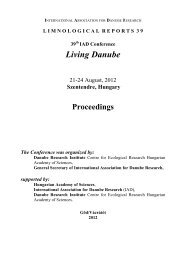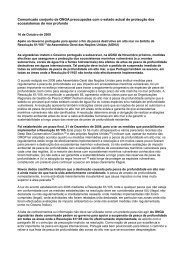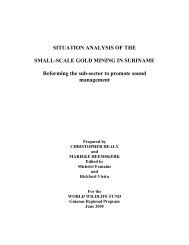Environmental Criteria for Hydropower in the Mekong Region - WWF
Environmental Criteria for Hydropower in the Mekong Region - WWF
Environmental Criteria for Hydropower in the Mekong Region - WWF
You also want an ePaper? Increase the reach of your titles
YUMPU automatically turns print PDFs into web optimized ePapers that Google loves.
The Current Status of <strong>Environmental</strong> <strong>Criteria</strong> <strong>for</strong> <strong>Hydropower</strong> Development <strong>in</strong> <strong>the</strong> <strong>Mekong</strong> <strong>Region</strong>: A litterature compilation<br />
Improvements <strong>in</strong> <strong>the</strong> capacity to <strong>in</strong>tegrate environment standards <strong>in</strong> power plann<strong>in</strong>g<br />
systems at <strong>the</strong> national level are thus important, such as ongo<strong>in</strong>g ef<strong>for</strong>ts to streng<strong>the</strong>n<br />
project EIA processes. At <strong>the</strong> same time, harmonization of environmental criteria <strong>in</strong><br />
<strong>the</strong> GMS will be crucial to ma<strong>in</strong>ta<strong>in</strong><strong>in</strong>g a level play<strong>in</strong>g field <strong>for</strong> private <strong>in</strong>vestment.<br />
A fur<strong>the</strong>r critique is that market orientation will re<strong>in</strong><strong>for</strong>ce <strong>the</strong> trend to separate <strong>the</strong><br />
operation phase environmental mitigation and management costs (<strong>in</strong>clud<strong>in</strong>g<br />
susta<strong>in</strong>able catchment management and downstream ecosystem services management,<br />
etc.) from <strong>the</strong> project operat<strong>in</strong>g budgets, and <strong>in</strong>stead, pass <strong>the</strong>se responsibilities on to<br />
local governments and decentralized agencies to cover with <strong>the</strong>ir normal operat<strong>in</strong>g<br />
budgets. In <strong>the</strong> GMS context, <strong>the</strong> local governments and agencies almost universally<br />
have limited technical capacity and f<strong>in</strong>ancial resources <strong>for</strong> this role. Thus <strong>the</strong><br />
argument <strong>for</strong> establish<strong>in</strong>g mechanisms to <strong>in</strong>ternalize environmental and social costs <strong>in</strong><br />
<strong>the</strong> rules re<strong>for</strong>m<strong>in</strong>g power markets is doubly re<strong>in</strong><strong>for</strong>ced (i.e. to move toward<br />
environmentally susta<strong>in</strong>able hydropower development us<strong>in</strong>g market mechanisms,<br />
where a sufficient portion of gross revenue from generation or resource utilization<br />
fees is targeted, or “r<strong>in</strong>g fenced” <strong>for</strong> long-term environmental and social management<br />
commitments as identified <strong>in</strong> project EMPs and bas<strong>in</strong> level SEAs).<br />
Relevance of parallel re<strong>for</strong>ms <strong>in</strong> o<strong>the</strong>r sectors - The recent passage of electricity<br />
laws <strong>in</strong> each GMS country (post-1995) typically requires that all hydropower projects<br />
must be developed <strong>in</strong> an environmentally friendly manner to m<strong>in</strong>imize ecosystem<br />
impacts. For <strong>in</strong>stance, <strong>the</strong> Electricity Law (1997) of Lao PDR (Article 6) provides<br />
that, “…operation of electricity production shall … ensure economic enterprises do<br />
not damage <strong>the</strong> environment, ecological system, liv<strong>in</strong>g conditions, and natural habitat<br />
of wildlife.” Power sector laws generally do not go fur<strong>the</strong>r; ra<strong>the</strong>r <strong>the</strong>y stipulate that<br />
<strong>in</strong>dividual projects must comply with exist<strong>in</strong>g environment legislation and<br />
regulations.<br />
Progress <strong>in</strong> environment capacity build<strong>in</strong>g and <strong>the</strong> quality of environment<br />
management tools used <strong>in</strong> <strong>the</strong> power sector (like SEAs, EIAs, EMPs), which<br />
generally fall with<strong>in</strong> <strong>the</strong> purview of environment agencies, is <strong>the</strong>re<strong>for</strong>e critical. How<br />
<strong>the</strong> environment laws are <strong>in</strong>terpreted on <strong>the</strong> ground, of course, is ultimately connected<br />
with how environment, economic and social dimensions are balanced <strong>in</strong> power sector<br />
plann<strong>in</strong>g. Clearly consensus build<strong>in</strong>g is needed to avoid distortions or imbalances<br />
where one m<strong>in</strong>istry has a stronger political base, especially if <strong>the</strong>re is limited<br />
participation outside government. This is typically <strong>the</strong> case <strong>in</strong> <strong>the</strong> GMS where <strong>the</strong><br />
environment m<strong>in</strong>istries, who have to argue <strong>the</strong> environment side of <strong>the</strong> susta<strong>in</strong>ability<br />
triangle (economic, environment and social) are often junior to <strong>in</strong>dustry m<strong>in</strong>istries<br />
responsible <strong>for</strong> national power policies and <strong>in</strong>dustrialization strategies.<br />
The emergence of a bas<strong>in</strong> approach to water resource plann<strong>in</strong>g <strong>in</strong> national legislation<br />
is perhaps <strong>the</strong> most significant new policy direction relevant to fram<strong>in</strong>g environment<br />
criteria <strong>for</strong> hydropower development (as discussed above). To <strong>the</strong> extent that IRBM<br />
becomes accepted as <strong>the</strong> framework to balance all water use <strong>in</strong>terests, hydropower<br />
and <strong>the</strong> environment <strong>in</strong>cluded, bas<strong>in</strong>-level decision processes would become <strong>the</strong><br />
major arena <strong>for</strong> decisions on <strong>the</strong> development and management of hydropower assets.<br />
28


